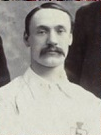Who was Blackburn Rovers’ greatest goalscorer? Was it Shearer, Sutton, Tommy Briggs, Simon Garner, or present day poacher, Jordan Rhodes?
Believe it or not, one former player, actually born and bred in Blackburn, is up there with the best of them when it comes to his record of scoring goals for Rovers. His strike rate is even higher than Alan Shearer’s!
Jack Southworth was born on Ainsworth Street in 1866 and baptised in what became Blackburn Cathedral. He came from a musical family and would go on to become a professional musician when his football career was ended by injury.
His brother Jim, also a musician, played alongside his sibling for Rovers. Both of them started playing with Rovers’ town rivals, Blackburn Olympic. But after earlier rejections, they were eventually lured across Corporation Park from Shear Brow to Leamington Road.
Jack quickly became a favourite with the Rovers fans, who nicknamed him ‘Skimmy’, due to his speed. He became a deadly striker, dubbed the ‘Prince of Dribblers’ and was popping them in at an important time in our history.
We become founder members of the Football League in 1888. Next came our move to Ewood Park. There was also a small matter of Rovers winning two FA Cups in 1890 & 1891. The first of these while still playing at Leamington Road and our next after the move to our current home. Jack scored in both victories. He also played three times for England, inevitably scoring in all three games.
Although we are taking about those early days of organised football, Southworth’s goals record is still incredible. He played 132 Football League and FA Cup matches for Rovers, scoring 121 goals. He scored Rovers’ first ever goal in the Football League and he still holds Blackburn Rovers’ record for the most individual hat-tricks in a season, with five in 1890–91, and the record for the aggregate individual hat-tricks with thirteen.
Sadly, Skimmy and the Rovers fell out over football’s perennial curse – money. Although Southworth had a good point in his argument about wishing to move to Everton to further his musical career. The Toffees had just moved into their new Goodison Park ground and were splashing the cash. They paid Rovers £400 and took away our first prolific goal scorer – no doubt some former fans of the then recently defunct ‘Lympic would have had a laugh at their fellow townsfolk’s loss.
The real reason for his transfer was Rovers’ developing financial problems due to the Ewood Park move and joining the Football League. But Jack was still pilloried by the local press and Rovers fans for jumping ship. At least he was given his say in a letter which they published. He explained his reasons candidly, for both financially and musically, wanting away. The latter was obviously his first love. Even at the height of his powers at Rovers, the 1891 census has him living in Inkerman Street and his occupation listed as a musician.
At Everton he was a sensation in his first season, scoring 27 goals in 22 games. It looked more of the same in his second season, with nine goals in as many games. But then he was struck by a leg injury which ended his football career. Fortunately, he had other strings to his bow in more ways than one and became a professional violinist with the Halle Orchestra. He went on to play different instruments in various famous orchestras across the north for several years.
Jack Southworth died in in Liverpool in 1956. He was nearly 90. He may not have been Rovers’ greatest striker, but he was certainly our most artistic.


You must be logged in to post a comment.